|
|
|
Sort Order |
|
|
|
Items / Page
|
|
|
|
|
|
|
| Srl | Item |
| 1 |
ID:
189959
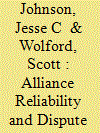

|
|
|
|
|
| Summary/Abstract |
States form defensive alliances hoping to deter adversaries and avoid war. However, scholars and policy analysts often worry that if an alliance fails to deter the promise of military support will encourage escalation, pushing disputants closer to war. We show that in many cases this concern is unwarranted. We use a game-theoretic model of alliance reliability and crisis bargaining to show that the same factors that indicate unreliability and provoke disputes also encourage alliance members to make concessions rather than risk war. We test this hypothesis using a sample of militarized disputes initiated against members of defensive alliances, where recent shifts in military capabilities represent changes in challengers’ estimates of alliance reliability. Less-reliable alliances are less likely than reliable allies to deter disputes, but they also decrease the probability of escalation relative to reliable alliances. Unreliable alliances need not encourage war; rather, they can discourage it.
|
|
|
|
|
|
|
|
|
|
|
|
|
|
|
|
| 2 |
ID:
189965
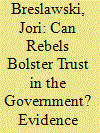

|
|
|
|
|
| Summary/Abstract |
Commitment problems make civil wars difficult to end. Research on overcoming commitment problems focuses on warring parties, however civilians’ perceptions are central to successful transitions from war to peace. While civilians residing in areas previously controlled by armed groups may be highly distrustful that governments will implement peace agreements, I argue that some armed groups are both motivated and capable of improving trust in the state. Using survey data from civilians in the Bangsamoro, Philippines, I show that civilians that experienced rebel security provision or rebel justice provision from the MILF are more likely to trust that the Government of the Philippines will fully implement the peace agreement than civilians that did not experience rebel governance provision.
|
|
|
|
|
|
|
|
|
|
|
|
|
|
|
|
| 3 |
ID:
189958
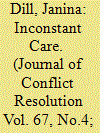

|
|
|
|
|
| Summary/Abstract |
The choice between protecting friendly soldiers or foreign civilians is a critical strategic dilemma faced in modern war. Prevailing theories suggest that casualties among both groups depress war support in Western democratic societies. Yet we know little about how ordinary citizens balance force protection and civilian casualty avoidance, and whether public opinion differs across Western democracies. Using survey experiments, we test three micro-foundations for what we call individuals’ “harm-transfer preferences:” self-interest, perception of soldiers’ consent to risk-taking, and nationalism. We find that respondents’ perception of soldiers’ consent and respondents’ nationalism explain individual-level variation in harm-transfer preferences. Moreover, Israeli citizens are significantly more likely than American or British citizens to prefer protecting friendly forces over avoiding foreign civilian casualties. This is associated with higher levels of nationalism and the perceptions that soldiers do not consent to risking their lives in Israel compared to the United States and the United Kingdom.
|
|
|
|
|
|
|
|
|
|
|
|
|
|
|
|
| 4 |
ID:
189962


|
|
|
|
|
| Summary/Abstract |
What is the relationship between domestic terrorism and voting behavior? Past research notes the prevalence of domestic terrorist attacks in democratic regimes, but focuses primarily on such violence as a “weapon of the weak.” We extend this literature by focusing on terrorism by incumbent-aligned armed groups and argue these actors use selective violence against political elites to delegitimize the political opposition and provide credible signals of the instability and unrest that is likely to accompany a transfer of power. Using data from two Argentine presidential elections in 1973, we evaluate the relationship between incidents of violence and changes in two measures of voting behavior—vote share and turnout. Consistent with expectations, left-wing political violence between elections reduced right-wing vote share but did not reduce turnout. Additional tests support the mechanism that violence increased voters’ doubts about a potential right-wing government’s ability to govern, and show violence is correlated with future repression.
|
|
|
|
|
|
|
|
|
|
|
|
|
|
|
|
| 5 |
ID:
189966
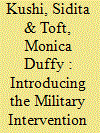

|
|
|
|
|
| Summary/Abstract |
While scholars have made many claims about US military interventions, they have not come to a consensus on main trends and consequences. This article introduces a new, comprehensive dataset of all US military interventions since the country’s founding, alongside over 200 variables that allow scholars to evaluate theoretical propositions on drivers and outcomes of intervention. It compares the new Military Intervention Project (MIP) dataset to the current leading dataset, the Militarized Interstate Disputes (MID). In sum, MIP doubles the universe of cases, integrates a range of military intervention definitions and sources, expands the timeline of analysis, and offers more transparency of sourcing through historically-documented case narratives of every US military intervention included in the dataset. According to MIP, the US has undertaken almost 400 military interventions since 1776, with half of these operations undertaken between 1950 and 2019. Over 25% of them have occurred in the post-Cold War period.
|
|
|
|
|
|
|
|
|
|
|
|
|
|
|
|
| 6 |
ID:
189960


|
|
|
|
|
| Summary/Abstract |
That terrorism is a “weapon of the weak” is such deeply held conventional wisdom it has become almost a cliché. “Weak” means many different things in the literature, however, and little rigorous empirical research has tested the contention that weaker groups, however conceived, are more likely to employ terrorism. This article explores prominent weapon of the weak arguments to develop testable hypotheses about group strength and the prevalence of terrorism. Using measures of deliberately indiscriminate attacks on civilians by rebel groups in civil conflicts, as well as multiple measures of rebel strength, it examines systematically whether weaker groups are more likely to employ terrorism. I find surprisingly little empirical support for the conventional wisdom. There is no clear or consistent evidence that deliberately indiscriminate terrorism is a weapon of the weak rather than the strong.
|
|
|
|
|
|
|
|
|
|
|
|
|
|
|
|
| 7 |
ID:
189963
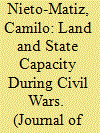

|
|
|
|
|
| Summary/Abstract |
Revenue, especially that from agricultural crops, has been considered fundamental for the development of state capacity. While existing research has mostly focused on dynamics of violence, we know less about the impact of commodities shocks on a key dimension of state power: property taxation. In this article, I explore how and why land-based coalitions—alliances between landowners and paramilitaries around the appropriation of land—undermine taxation during civil conflict. Focusing on the expansion of oil palm in Colombia and using a difference-in-differences design, I leverage the international price of oil palm and municipal variation in crop suitability. I find that, in municipalities with higher paramilitary violence and land concentration, the palm shock was associated with lower taxation, outdated cadastral information, and lower land values. This article underscores the deleterious consequences of land inequality for the state’s extractive capacity even in moments of agricultural abundance.
|
|
|
|
|
|
|
|
|
|
|
|
|
|
|
|
| 8 |
ID:
189957


|
|
|
|
|
| Summary/Abstract |
It is a common stereotype that leaders lie, but for all our beliefs about how normal it is for a president to lie to the public we know next to nothing about how voters might actually view this conduct. Drawing from literature in behavioral economics, we theorize that voters apply their attitudes towards interpersonal lies when judging leaders, with people who see lying as more socially acceptable being less willing to punish leaders for exhibiting this behavior. Using a novel vignette-style survey experiment, we find strong support for our theory: despite widespread willingness to punish leaders who lie, individuals high in Machiavellianism and Self-Monitoring are far less willing to punish presidents for lying than their low-type peers, and in some cases do not punish at all. Using robustness checks and causal mediation analysis, we confirm that views regarding the moral acceptability of lying drive responses to presidential deception.
|
|
|
|
|
|
|
|
|
|
|
|
|
|
|
|
|
|
|
|
|